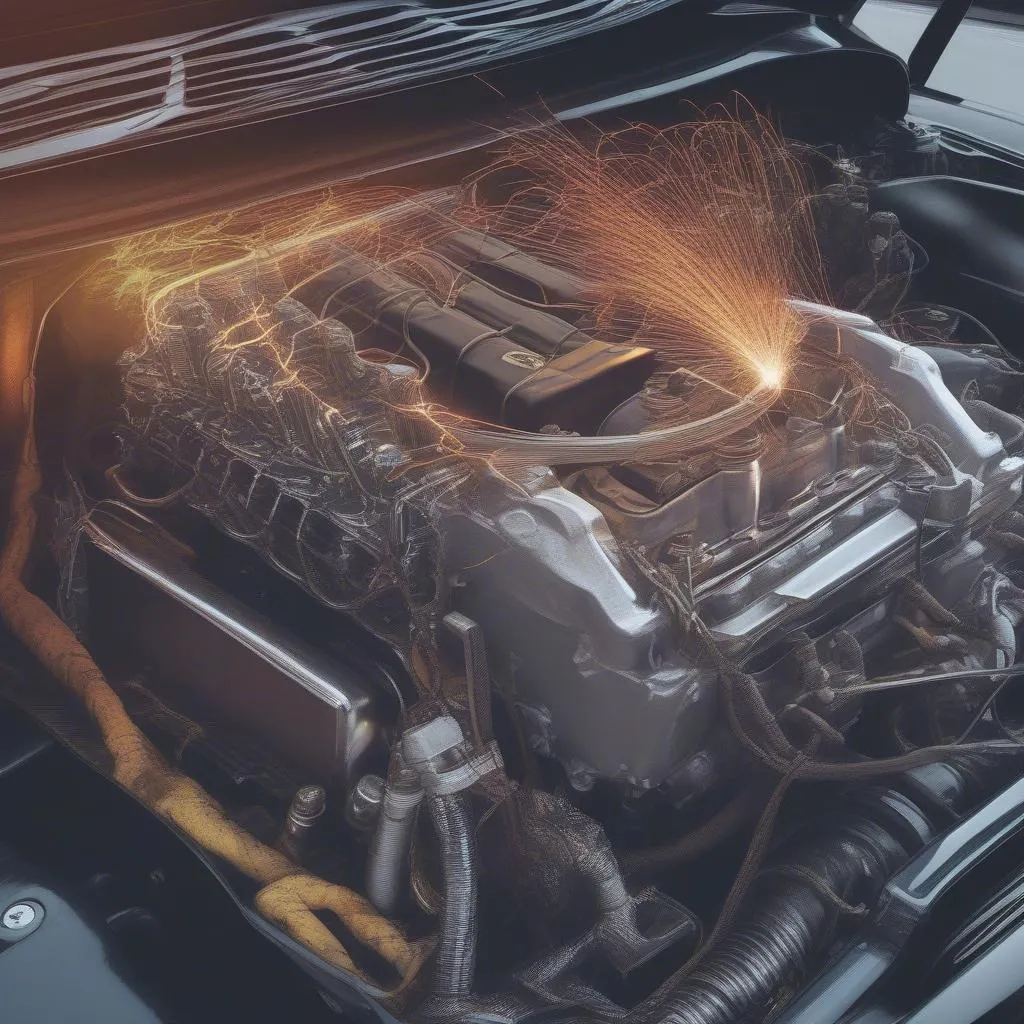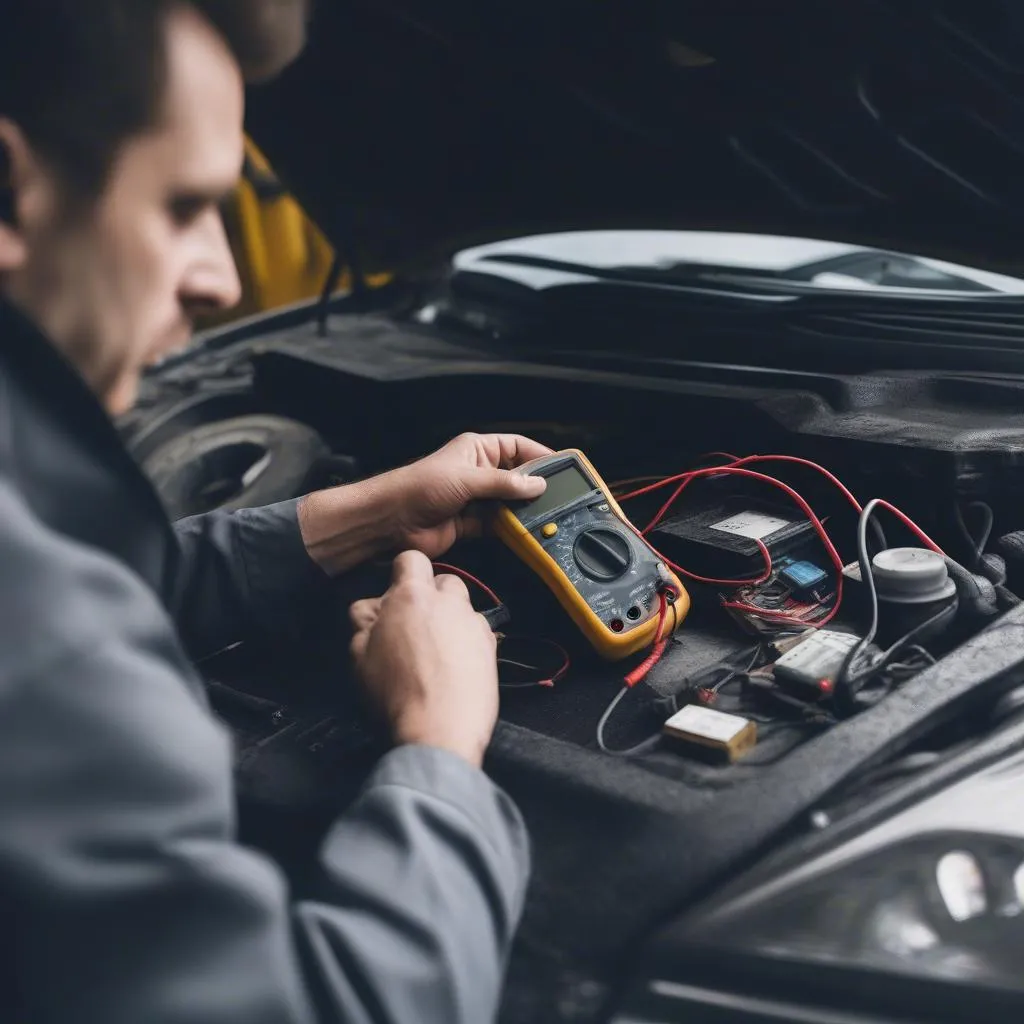Have you ever been driving down the road when your car suddenly sputtered, your lights went out, or your engine stopped? These are just a few of the symptoms of a car short circuit. In this article, we’ll explore the common signs of a car short circuit, the potential causes, and how to diagnose and fix the problem.
What is a Car Short Circuit?
A car short circuit occurs when electricity takes an unexpected path through your car’s electrical system. It’s like a traffic jam on the electrical highway, where instead of following the designated lanes, the current takes a shortcut through a wrong route. This can lead to a wide range of problems, from minor inconveniences to serious damage.
Common Symptoms of a Car Short Circuit
Let’s delve into the common symptoms you might encounter:
1. Dim or Flickering Lights
This is a telltale sign of a short circuit. Your headlights, taillights, dashboard lights, or even your interior lights may dim or flicker unexpectedly.
2. Dead Battery
A short circuit can drain your battery quickly. If you notice your car battery constantly needing a jump start or is frequently discharged, a short circuit could be the culprit.
3. Electrical Components Failing
This could include your radio, power windows, power locks, or even your air conditioning system. If you’ve noticed multiple electrical components failing unexpectedly, a short circuit could be the root cause.
4. Burning Smell
If you smell a burning smell coming from your car, especially near the dashboard or engine compartment, this could indicate a short circuit.
5. Fuses Blowing
A short circuit can cause fuses to blow frequently. This is a safety mechanism to protect your car’s electrical system from further damage.
6. Engine Stalling
In some cases, a short circuit can even cause your engine to stall or fail to start. This usually happens when the short circuit affects a critical component like the ignition system or fuel injection system.
What Causes a Car Short Circuit?
1. Damaged Wiring
Damaged or frayed wires are a common cause of short circuits. This can happen due to wear and tear, exposure to moisture, or even rodents chewing on the wires.
2. Corrosion
Corrosion can build up on electrical connections, leading to a short circuit.
3. Loose Connections
Loose electrical connections can also cause a short circuit. When connections are loose, they can create a pathway for electricity to flow unexpectedly.
4. Aftermarket Accessories
Installing aftermarket accessories, such as car alarms, stereo systems, or LED lights, can sometimes lead to short circuits if not properly wired.
5. Damaged Components
Damaged electrical components, such as a faulty alternator or starter motor, can also cause a short circuit.
How to Diagnose a Car Short Circuit
Diagnosing a short circuit can be tricky, but here are a few steps you can take:
1. Check the Fuses
Start by checking the fuses in your car’s fuse box. If a fuse is blown, it’s a sign that a short circuit may have occurred.
2. Look for Damaged Wiring
Inspect your car’s wiring for any signs of damage, such as frayed wires, exposed wires, or corrosion.
3. Test Electrical Connections
Make sure all electrical connections are secure and free from corrosion.
4. Use a Multimeter
A multimeter can help you test the electrical circuits in your car and identify any problems.
Fixing a Car Short Circuit
Remember: It’s always best to have a qualified mechanic diagnose and repair a short circuit. If you’re not comfortable working with electrical systems, it’s best to leave this job to the professionals.
Here’s what a mechanic might do:
- Locate the Short Circuit
The mechanic will use a multimeter to test the electrical circuits and locate the source of the short circuit.
- Repair or Replace Damaged Wires
Any damaged wires will need to be repaired or replaced.
- Clean or Replace Electrical Connections
Any corroded or loose connections will need to be cleaned or replaced.
- Replace Damaged Components
If a component is damaged, it will need to be replaced.
Frequently Asked Questions
Q: What are some common Car Short Circuit Symptoms?
A: As we’ve seen, dim or flickering lights, a dead battery, electrical components failing, a burning smell, blown fuses, and even engine stalling are all common signs.
Q: What if I suspect a short circuit?
A: It’s wise to have a mechanic diagnose the problem. They have the specialized tools and expertise to pinpoint the issue and make the necessary repairs.
Q: Can I fix a car short circuit myself?
A: If you’re comfortable working with electrical systems and have the right tools, you might be able to fix a simple short circuit. However, it’s generally best to leave this job to a qualified professional to avoid any potential damage.
Q: How can I prevent a car short circuit?
A: Regularly inspect your car’s wiring for any signs of damage, keep electrical connections clean, and be careful when installing aftermarket accessories.
Resources
- [Link to Related TechCarUSA Article 1]
- [Link to Related TechCarUSA Article 2]
- [Link to Related TechCarUSA Article 3]
Need Help? Contact us at Whatsapp: +84767531508 for expert assistance with car electrical system diagnostics and repairs.
Don’t forget to leave a comment below and share this article with your friends!
 Symptoms of a Car Short Circuit
Symptoms of a Car Short Circuit
 Car Short Circuit Repair
Car Short Circuit Repair
 Car Fuse Box
Car Fuse Box
